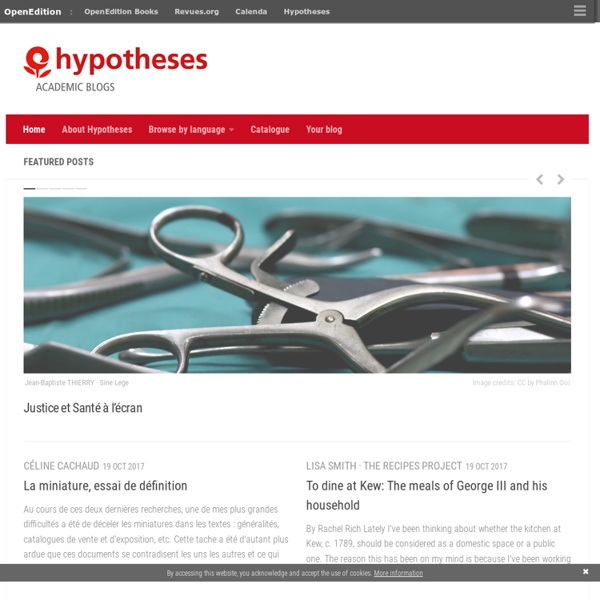



Spend 10 Minutes Doing This Every Day and You Could Transform Your Blogging Today I want to suggest an exercise that has the potential to improve your blogging profoundly if you build it into your daily routine. Look at another blog Image by zev OK – this may not sound that profound – most of us read other blogs every day but it doesn’t revolutionise what we do – but stick with me for a second while I explain HOW to do it in a way that could have a big impact.
Learning in a networked world What does learning look like in a world that is increasingly networked? How can we harness the ever-increasing range of online technologies to support effective learning? What are the implications for teachers, for students, and for the wider community? And what are the implications for distance education providers as the boundaries blur between them and traditional face-to-face providers? Europe PubMed Central Blog: UKPMC becomes Europe PubMed Central We are delighted to launch Europe PubMed Central (Europe PMC), which reflects a growing commitment from European Life Sciences research funders to make their research freely available around the world. As announced in July, the European Research Council (ERC) becomes the third European funder to join UKPMC, following Telethon Italy and the Austrian Research Fund. As a result of this participation, the 18 existing UK and European funders agreed that the UKPMC service should be rebranded as Europe PMC by 1 November 2012. The service can now be found at the following URLs: (For managing grants and publications for Europe PMC funder-supported researchers). (For showcasing new developments based on the content of Europe PMC).
Why dashboard design is critical to analytics success Usability, ease of navigation and the overall user experience are all very important in analytics dashboard design—but equally important is understanding what the end user's objectives are when he or she uses an analytics dashboard or a user interface—because if you don't know what they want to get out of the analytics, you risk losing the user. Missing a target on an analytics interface can have serious repercussions. Entire analytics projects have been shelved—not because of the business value of what an app can do—but because of a poorly designed user interface or dashboard that was impossible to understand or to navigate to results. How do you avoid this pitfall?
Track a Storyline Course Based on Visiting a Specific Slide One question that pops up in our community from time to time is how to track a non-linear, branching course based on learners visiting a specific slide. One easy way to do this is to use a freeform Pick One question and a Results slide that are both disguised as ‘regular’ slides. Take a look at this tutorial to see how I set this up. Set up the Freeform Pick One slide Create the Freeform Pick One question with a custom button. Open Monograph Press Open Monograph Press Open Monograph Press is an open source software platform for managing the editorial workflow required to see monographs, edited volumes and, scholarly editions through internal and external review, editing, cataloguing, production, and publication. OMP can operate, as well, as a press website with catalog, distribution, and sales capacities. Among the many features of OMP is its ability to…
Alliance for Networking Visual Culture » Overview Scalar received an “Excellent” rating and an Editor’s Choice nod from PCMag.com. Specializing in richness, depth, experimentation, and understanding. Scalar is a free, open source authoring and publishing platform that’s designed to make it easy for authors to write long-form, born-digital scholarship online. Scalar enables users to assemble media from multiple sources and juxtapose them with their own writing in a variety of ways, with minimal technical expertise required. More fundamentally, Scalar is a semantic web authoring tool that brings a considered balance between standardization and structural flexibility to all kinds of material.
CICE - Chaire de recherche sur l’Ingénierie cognitive et éducative > Accueil The CICE Research Chair on Instructional and Cognitive Engineering has a general mission to promote the use of information and communication technologies to extend human knowledge and competencies through research, experimentation and innovative applications, and to transfert research results, expertise and products to individuals and organizations. NEWS(on the Director's Web site) Gilbert Paquette et Olga marino have just publish a new book chapter entitled "A multi-Actor Ontology-Based Assistance Model: A Contribution to the Adaptive Semantic Web.